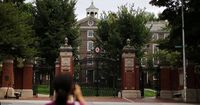A Brown University assistant professor and doctor was deported over the weekend from Boston to Lebanon after federal agents found photos of Hezbollah leader Hassan Nasrallah and Iran’s supreme leader on her cell phone, according to reports.
Dr. Rasha Alawieh, 34, had just returned to the U.S. on March 13, 2025, from Lebanon when the incident occurred. Federal agents at Boston Logan International Airport discovered the images on her phone, though the reason for examining her phone remains unclear. Details were revealed through court filings and confirmed by sources familiar with the case.
It was disclosed during questioning by authorities, as expressed through court documents, why multiple photos were deleted one to two days prior to her arrival back at Logan Airport. “I didn’t want to give authorities the perception I support Hezbollah and the Ayatollah politically or militarily,” Dr. Alawieh stated, according to the filings. She added, “If you listen to one of his sermons, you would know what I mean. He is a religious figure.”
Alawieh, who acknowledged attending Nasrallah's funeral on February 23, noted to federal agents during her detainment, “He is highly regarded.” Many viewed her participation as culturally significant rather than politically aligned, underscoring her explanation of observing his religious practices.
Attorney Stephanie Marzouk, representing Alawieh's family, spoke outside Boston's courthouse on March 17, 2025, expressing determination to fight for her return, emphasizing Alawieh’s role as a medical professional. “Our client is in Lebanon, and we’re not going to stop fighting to get her back in the U.S. to see her patients,” she said, highlighting the necessity of procedure should have been followed.
The U.S. Department of Homeland Security made comments reinforcing the rationale for Alawieh’s deportation, emphasizing, “Glorifying and supporting terrorists who kill Americans is grounds for visa issuance to be denied. This is common-sense security.” This statement underlines existing tensions surrounding immigration enforcement under the Trump administration.
During 2025, Alawieh’s case has drawn intense scrutiny within the legal system, as it raised questions about the nature and substance of her treatment by U.S. Customs and Border Protection (CBP). Judge Leo Sorokin, who had ordered Alawieh not to be relocated outside Massachusetts without advance notice, was apparently unaware of her removal until after it happened.
A subsequent court hearing originally set for March 17 was unexpectedly canceled, indicating procedural missteps on the part of CBP. According to CBP, officials did not receive notice of the court's order until Alawieh had already left the United States. “At no time would CBP not take a court order seriously or fail to abide by it,” stated CBP representatives.
Alawieh’s legal team indicates she may have been misled about her legal rights and access to legal counsel during her detainment. “She had no chance to contact anyone,” Marzouk added, which raises concerns about the transparency and due process within immigration enforcement protocols.
Dr. Alawieh graduated from the American University of Beirut, with her professional career beginning post-2018 when she entered the U.S. initially on various student and professional visas before obtaining her H-1B work visa to serve her position at Brown University’s Division of Nephrology.
The incident has sparked conversation within the immigration reform arena. The Council on American-Islamic Relations (CAIR) raised issues of discrimination against Muslim immigrants, stating, “Deporting lawful immigrants like Dr. Alawieh without any basis undermines the rule of law.”
Political figures, including Rhode Island Representative Gabe Amo, are pressing for clarification and resolution on Alawieh's status. "We need to be careful about sharing information publicly about any individual’s personal circumstances,” Amo indicated on social media.
On the academic front, Alawieh’s colleagues at Brown Medical School, including fellow nephrologist Dr. George Bayliss, who previously worked closely with her, expressed deep concern over her deportation, stressing the impact such actions have on the healthcare system and the growing physician shortage nationwide.
Bayliss reflected on her competency and value within the medical program: "She takes good care of her patients." The Doctor is reportedly one of few specialist kidney doctors working at Brown and the broader Rhode Island area.
Students and peers at Brown University have voiced support for Alawieh, urging the administration to advocate for her reinstatement. An email from Brown's administration advised faculty and students to assess their travel plans, acknowledging concerns surrounding immigration laws and enforcement.
Many see Dr. Alawieh’s case as emblematic of broader issues within U.S. immigration policy, particularly concerning individuals from Muslim-majority nations. The clash between national security, immigration enforcement, and individual rights may continue to be questioned as more details and legal arguments emerge.
Following her return to Lebanon, Dr. Alawieh's family intends to pursue legal actions aimed at reversing her deportation, reflecting larger themes of fairness, medical professionalism, and the ramifications of political policies on individual lives.






